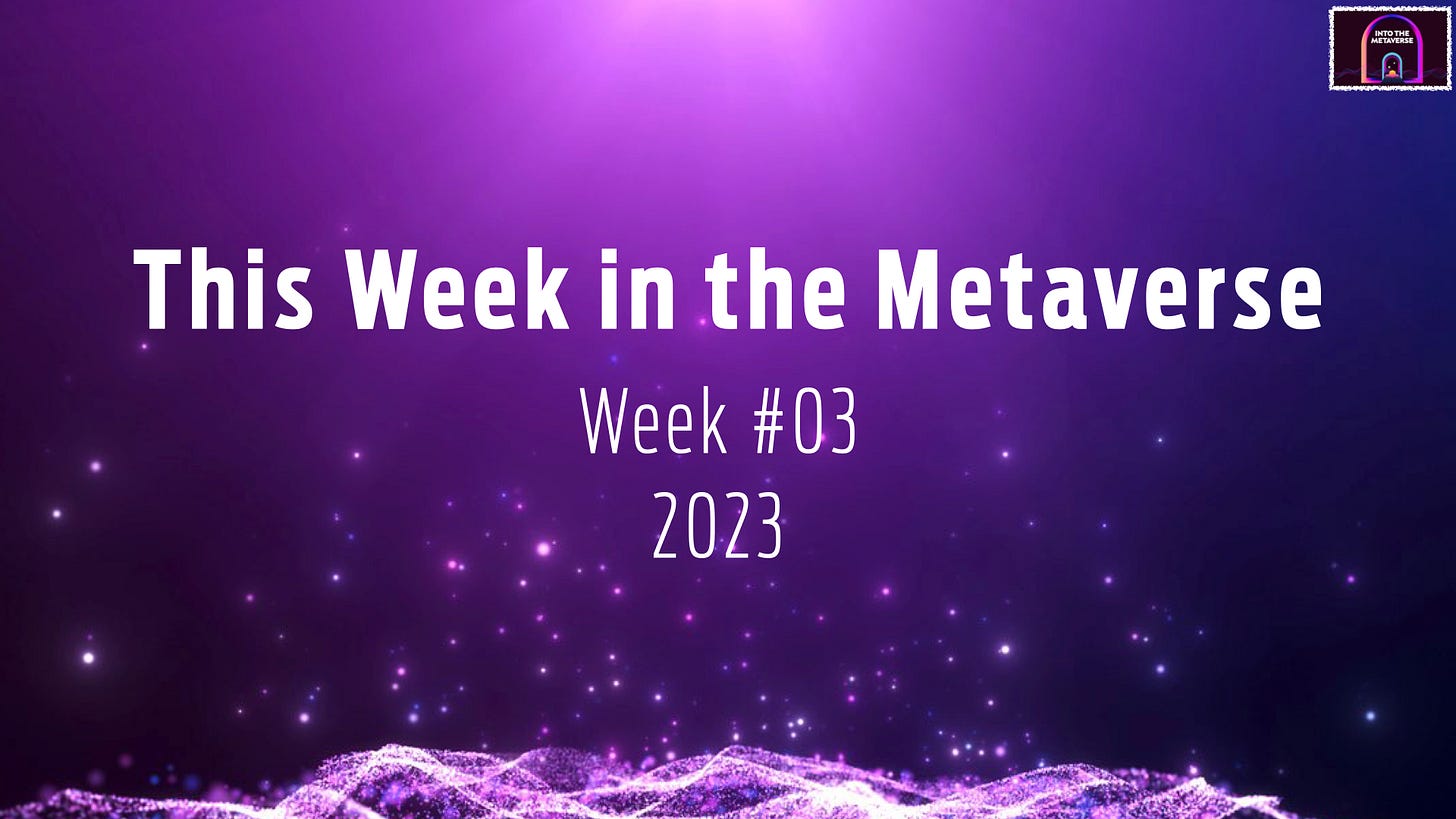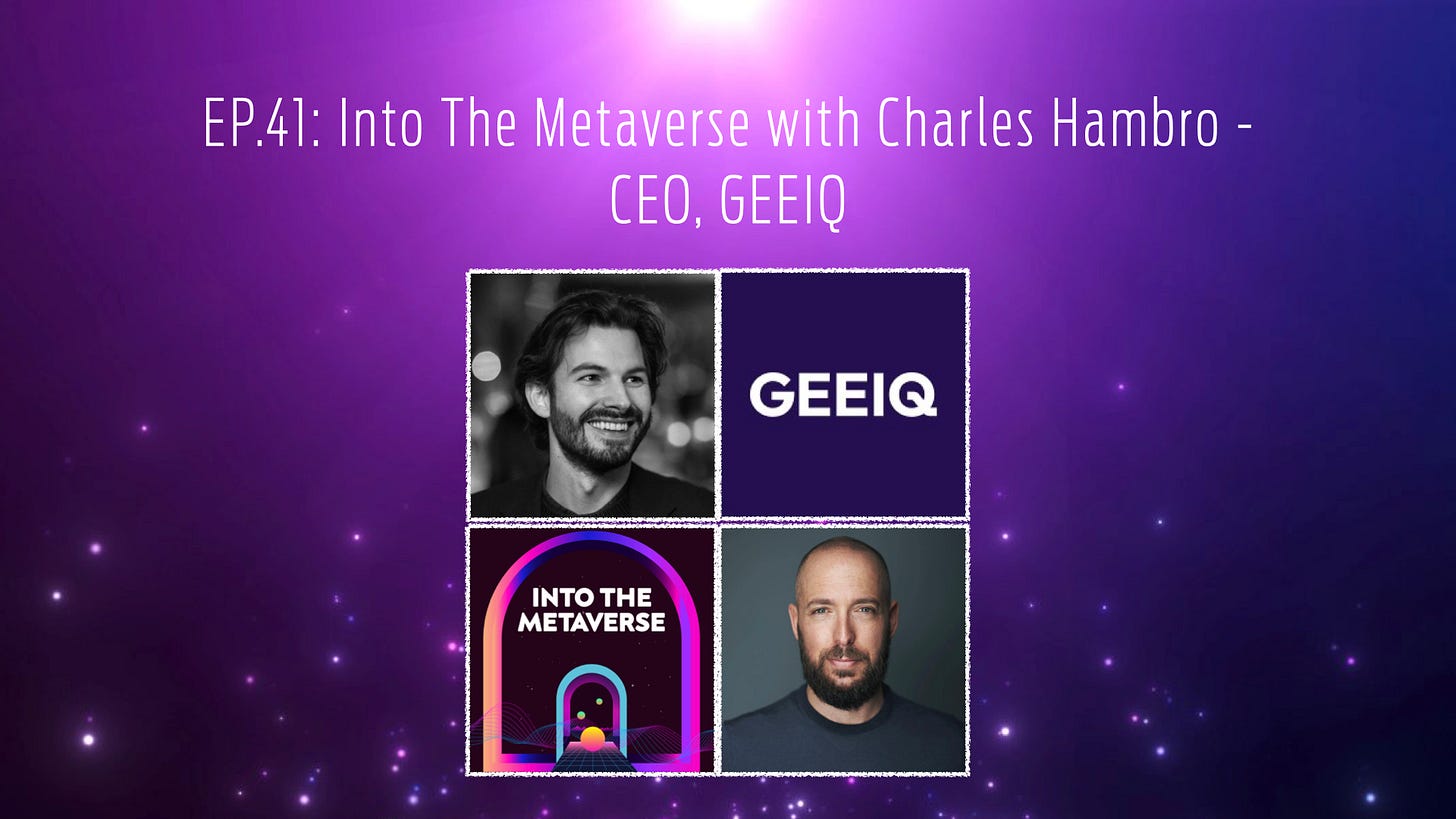This Week in the Metaverse (W03.2023)
World Economic Forum releases comprehensive research papers on defining, building and governing the Metaverse; GEEIQ CEO Speaks on Into The Metaverse podcast; and Roblox releases latest metrics.
Hey, I’m Yon. Welcome to Into The Metaverse! My mission is to help you understand what is the metaverse, how it will impact our lives, and what opportunities it unlocks. If you are a marketer, entrepreneur, investor or simply a curious professional, Into The Metaverse is for you. Subscribe (free) to get access to every letter and podcast show that I publish.
Here’s what I’ve got for you this week:
The Big Read: World Economic Forum releases comprehensive research papers on defining, building and governing the Metaverse
Latest on Into The Metaverse podcast: A conversation with Charles Hambro - CEO of GEEIQ, a data company that helps brands figure out their approach to entering metaverse platforms.
Weekly News Roundup
Let’s dig in!
(1) The Big Read: World Economic Forum Releases Comprehensive Research on Defining, Building and Governing the Metaverse
While the metaverse gradually evolves, the need to create a framework for how to think about it grows as well. We’ve seen many organizations taking a stab at defining the metaverse - among them venture capital firm A16Z (7 Essential Ingredients of a Metaverse, Accenture (Building a Responsible Metaverse), McKinsey (Value Creation in the Metaverse) and Coinbase (How Coinbase thinks about the Metaverse). Many more attempts at defining the metaverse took place on our podcast by some of the best builders and thinkers in the space.
One of the most widely used definitions for what is the metaverse is one proposed by Matthew Ball in his book The Metaverse and How It Will Revolutionize Everything: “A massively scaled and interoperable network of real-time rendered 3D virtual worlds that can be experienced synchronously with an individual sense of presence, and with continuity of data, such as identity, history, entitlements, objects, communications, and payments”.
The way in which the metaverse is defined will continue to be defined and redefined as the building blocks to enable it come to life and use case emerge that actually show the impact it will have on society, business, creators and consumers. By all current definitions the “true” metaverse does not exist yet and no one can predict when that will happen. Therefore mass adoption of whatever the “metaverse” becomes is simply unknown (although I do believe that anyone under 25 years of age already lives to some extent in the metaverse). That being said, there is a need to define the metaverse’s components to help identify its key components in its fabric and help guide investment decisions by leaders across the board.
Enters the World Economic Forum (WEF).
Last year the WEF launched a new initiative (which I’m delighted to be a part of) to help define and build the metaverse. As is standard with the WEF, the initiative brings together leaders and builders from many companies and organizations who work together on creating a set of documents and frameworks that provides a framework for how to think about a certain topic. In this initiative the WEF focuses on two working groups - Value Creation and Governance, and this week it released its first two research papers: (1) Demystifying the Consumer Metaverse; (2) Interoperability in the Metaverse. Below are key excerpts from the papers.
(1) Demystifying the Consumer Metaverse aims to give a holistic introduction to the consumer-facing metaverse and its economic opportunities. The key question the report asks itself is: What makes up the metaverse and how can organizations and individuals create equitable economic value through it in a consumer context?
The paper’s key insights:
While it currently is difficult to define the metaverse, its main distinguishing components are highlighted to be social interaction, identity, multilateral value exchange and distribution, and a degree of immersion.
Impacted by wider society – organizations and individuals can take on one or multiple roles in the metaverse, from being participants to creators or providers.
The role of individual creators will be amplified in the metaverse. Technologies such as AI and blockchain, will support this amplification. An evolving creator economy will influence value distribution in the metaverse greatly and offer far-reaching opportunities for businesses and individuals, but it will also pose challenges when approached incorrectly.
Eight economic models were identified to drive value in the metaverse, including digital products and assets, access and influence, immersive commerce, payments and currency, asset monetization, advertising and marketing, the creator economy, and metaverse-native services.
A selection of six drivers of metaverse growth and adoption were identified, including metaverse-ready networks, realistic avatars, infrastructure, governance, standards and regulation, ownership and artificial intelligence.
Access the full paper here.
(2) Interoperability in the Metaverse aims to explain the topic of interoperability, which is founded on the ability of data to circulate via interoperable infrastructures, of participants to be able to move themselves, their assets and their creations across platforms and experiences, and of experiences being safeguarded through collaboration and guardrails such as content moderation. For the metaverse to operate seamlessly, it will require varying degrees of interoperability for users to move, create, transact and participate across different platforms and localities.
The paper’s key insights:
Interoperability in the metaverse can present enormous opportunities and value for frictionless experiences, development and economies.
Frictionless experiences enable users to move across and between the physical and digital world with relevant data, digital assets and identity(s). This could facilitate greater consumer engagement but also provide efficiencies in enterprise, as well as industrial applications.
The standardization of tools and both the formation and adoption of uniform development practices resulting from interoperability could allow stakeholders to benefit from frictionless development – or network effects that provide efficiencies and cost savings across consumer, enterprise and industrial interaction paradigms.
Frictionless economies allow for greater access, marketplace engagement through healthy competition, transactional efficiencies and trust if interoperability balances privacy, security and safety. Such new market opportunities will be able to make use of existing economies of scale while providing new potential revenue streams, access to new audiences and possible points of connection for enterprise partnerships and industrial logistics.
Access the full paper here.
Overall these papers are an excellent attempt by the World Economic Forum and the initiative’s participants at increasing the knowledge and understanding of the metaverse and key components involved in building a metaverse that can work for everyone. The real work is in front of us - actually building a meaningful metaverse.
(2) Latest on Into The Metaverse podcast: A conversation with Charles Hambro - CEO, GEEIQ
In episode 41 I host Charles Hambro, co-founder and CEO of GEEIQ (pronounced "Geek") - a data company that helps brands figure out their approach to entering metaverse platforms.
The first time I came across GEEIQ is when I read an article that covered NARS Color Quest, the experience that my company Supersocial created on Roblox with NARS Cosmetics, and I was curious about Charles’ work and hence the connection made.
We cover in detail what brands are looking for as we kickoff 2023 and why data and measurement are going to play a key role in shaping the way in which brands engage in the metaverse.
Listen to the episode on: Apple / Spotify / Anchor.
Watch:
(3) Weekly News Roundup
Roblox Reports December 2022 Key Metrics (link) → Showing an all-time high number of Daily Active Users - 61.5m.
2022 Year In Review – Letter from Roblox CEO (link) → Dave Baszucki writes about Enabling Self-Expression and Connection, Expanding Creator Opportunities, Evolving Roblox’s Virtual Economy, Investing in Safety and Civility, and Creating Opportunities for Brands.
Linux Foundation launches Open Metaverse Foundation to move the metaverse to reality (link) → The goal is to provide a collaboration space for diverse industries to work on developing open-source software and standards for an inclusive, global, vendor-neutral and scalable metaverse, said Royal O’Brien, executive director of the OMF, in an interview with GamesBeat. Complement this item with the conversation I had with Royal on Into The Metaverse + also with Neil Trevett who’s the Chair of the Metaverse Standards Forum.
Game developers think the metaverse is bogus, survey shows (link) → A survey of over 2,300 game developers reveals that game makers don’t buy the promise of the metaverse. They don’t put much stock in blockchain technology either.
Celebrity power fuels fashion’s Roblox strategy (link) → Fashion brands including Gucci are getting comfortable on the platform, with celebrity partnerships driving engagement and fanfare.
Which Brands Have the Most Followers on Roblox? (link) → my friend Stephen Dypiangco shares some data and insights on how brands manage followers on Roblox.
Decentraland 2023 Manifesto: Year of the Creators (link) → Decentraland’s goals for 2023 are to Unleash Content Creators’ Creativity, Make Decentraland More Fun, Improve Performance. Dig deeper on Decentraland by listening to my conversation with its Marketing Director on the Ethos of Decentraland.
Apple Delays AR Glasses, Plans Cheaper Mixed-Reality Headset (link) → Lower-cost version of mixed-reality headset now in development
Metahood Raises $3M to Build the Zillow of the Metaverse (link) → Metahood’s platform is designed to deliver more context for metaverse land buyers than a general-purpose NFT marketplace. It uses a map-driven interface to show available land plots in relation to those around it, providing a sense of the wider neighborhood or district while pointing out landmarks and highlighting sales trends, nearby land owners, and more. Complement this item by listening to the conversation I had with the CEO of LandVault on Why Virtual Land Matters.
Thank you for subscribing to Into The Metaverse. We grow when readers who appreciate our work spread the word.






